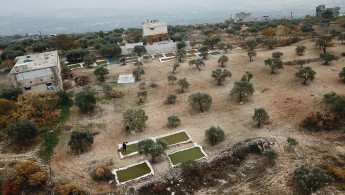Syrian regime confiscates, sells hundreds of square kilometres of land belonging to refugees: report
The Assad regime has seized extensive areas of agricultural land in northwestern Syria and sold them at public auctions, the Syrian Network for Human Rights (SNHR) has said.
In a report published on Sunday, the SNHR said that the Assad regime seized 440,000 dunums (440 square kilometres) of agricultural land in Hama and southern Idlib provinces and announced public auctions to sell the land.
No compensation was offered to the owners of the property. Southern Idlib province and parts of Hama province were held by opposition forces until 2019 and SNHR characterized the land seizures as a form of “collective punishment” of those “already dispossessed”.
|
|
The Assad regime, aided by Russia, launched a number of assaults on Idlib province in 2019 and 2020, capturing areas held by opposition forces and displacing hundreds of thousands of people.
SNHR said in its report that the regime had used a number of laws and legislative decrees to seize the land, including Legislative Decree 63 of 2012, which permits the confiscation of land belonging to “terrorists”.
The SNHR added that it had recorded 22 announcements of land auctions, covering farmland around 134 towns and villages in Hama province and 88 towns and villages in Idlib province.
Read more: Assad's sham Syrian refugee conference marks dark 50th year of regime
The auctioned lands include farms used for the production of wheat, barley, potatoes, and olives, as well as fish farms and uncultivated lands according to the SNHR.
The SNHR’s chairman, Fadel Abdul Ghany, warned that the Assad regime’s land seizures could be extended to other areas of Syria formerly held by opposition forces.
“The Syrian regime has recently focused on a new strategy of seizing lands in… Hama and Idlib, but, based on our experience with the mentality and approach of the Syrian regime, we at the Syrian Network for Human Rights believe that this approach will be extended to include other areas in the Eastern Ghouta, Daraya and Southern Syria”, he said.
Opponents of the Assad regime have previously accused it of trying to engineer demographic change in Syria, preventing the return of refugees, seizing their property, and trying to replace potentially rebellious, mostly Sunni, populations with groups from outside Syria.
Syrian President Bashar al-Assad is from the country’s Alawi minority and his regime has received backing from mainly Shia Iran and Iraqi and Lebanese militia groups allied with it.
Recently, the Syrian regime announced that it would seize property and assets belonging to refugees and displaced people who did not pay exorbitant fees exempting them from military service.
Follow us on Facebook, Twitter and Instagram to stay connected





 Follow the Middle East's top stories in English at The New Arab on Google News
Follow the Middle East's top stories in English at The New Arab on Google News


